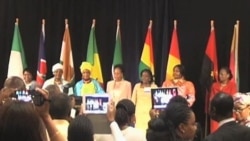LOS ANGELES —
The first ladies of five African nations have addressed the challenges women and children face in their countries and what needs to be done to improve their lives, especially in health care. Dignitaries from numerous African nations met in Los Angeles to exchange ideas and seek help.
The risk of death from childbirth is still very real for women in countries throughout Africa. Whether their children will reach adulthood is another worry.
The first ladies of Guinea, Mali, Mozambique, Niger and Namibia -- and many more African officials -- are voicing their concerns for the health and welfare of the women and children in their countries. They are meeting in Los Angeles, at the second African First Ladies Health Summit to talk about issues including infant and maternal mortality, the transfer of HIV AIDS from mother to child and problems with sanitation.
The first lady of Guinea, Djené Kaba Condé, says she is in the United States to seek help because children in Guinea die prematurely, due to a lack of incubators for babies.
Annette Richardson with the United Nations office of Partnerships praised the first ladies for their efforts to improve the lives of women and children in their countries, but she says there still is more work to be done.
“When it comes to having an impact on health in Africa you’re all grassroots activists for Africa’s mothers and babies. As first ladies of your respective countries you have the influence and the networks that cannot be duplicated by outside organizations," Richardson said. "You’re the ones who are on the front lines to have the ability to see the effects of these pressing issues and are best suited to mobilize local resources.”
The Republic of Congo's Social Affairs Minister, Emilienne Raoul, says poverty is the root cause of many problems in Africa.
She says as a result, many people do not have access to health care and education, but if they work together, with international solidarity and private partnerships, she believes they can eliminate the problems caused by poverty.
Some of these ladies say they hope there will be a way to measure progress in improving the lives of women and children in Africa so that the next time they meet, they will know what works and what needs improvement.
The risk of death from childbirth is still very real for women in countries throughout Africa. Whether their children will reach adulthood is another worry.
The first ladies of Guinea, Mali, Mozambique, Niger and Namibia -- and many more African officials -- are voicing their concerns for the health and welfare of the women and children in their countries. They are meeting in Los Angeles, at the second African First Ladies Health Summit to talk about issues including infant and maternal mortality, the transfer of HIV AIDS from mother to child and problems with sanitation.
The first lady of Guinea, Djené Kaba Condé, says she is in the United States to seek help because children in Guinea die prematurely, due to a lack of incubators for babies.
Annette Richardson with the United Nations office of Partnerships praised the first ladies for their efforts to improve the lives of women and children in their countries, but she says there still is more work to be done.
“When it comes to having an impact on health in Africa you’re all grassroots activists for Africa’s mothers and babies. As first ladies of your respective countries you have the influence and the networks that cannot be duplicated by outside organizations," Richardson said. "You’re the ones who are on the front lines to have the ability to see the effects of these pressing issues and are best suited to mobilize local resources.”
The Republic of Congo's Social Affairs Minister, Emilienne Raoul, says poverty is the root cause of many problems in Africa.
She says as a result, many people do not have access to health care and education, but if they work together, with international solidarity and private partnerships, she believes they can eliminate the problems caused by poverty.
Some of these ladies say they hope there will be a way to measure progress in improving the lives of women and children in Africa so that the next time they meet, they will know what works and what needs improvement.





